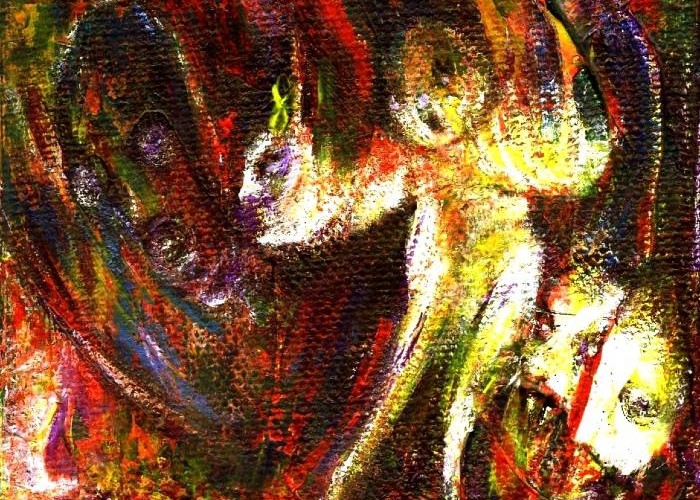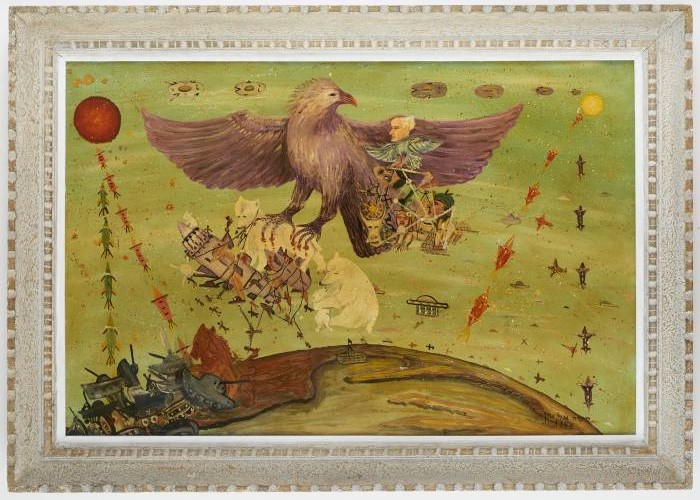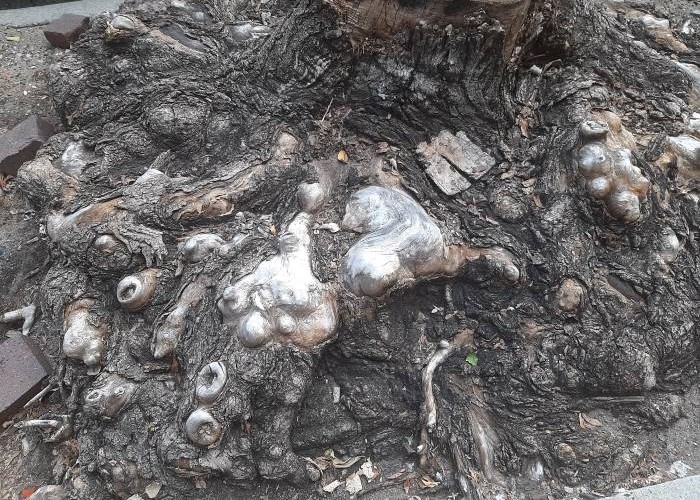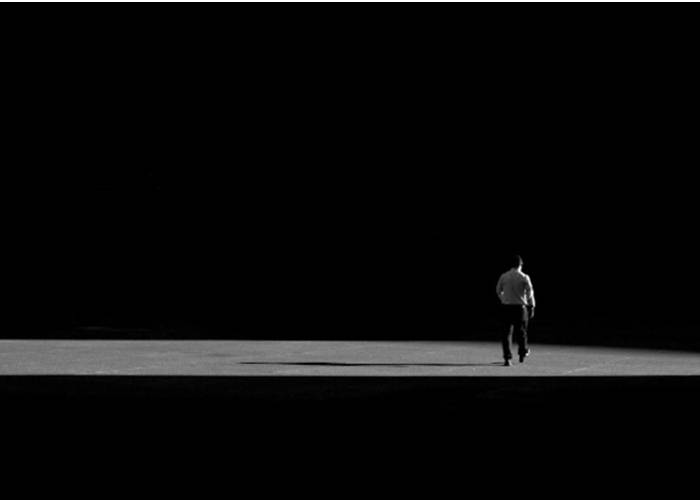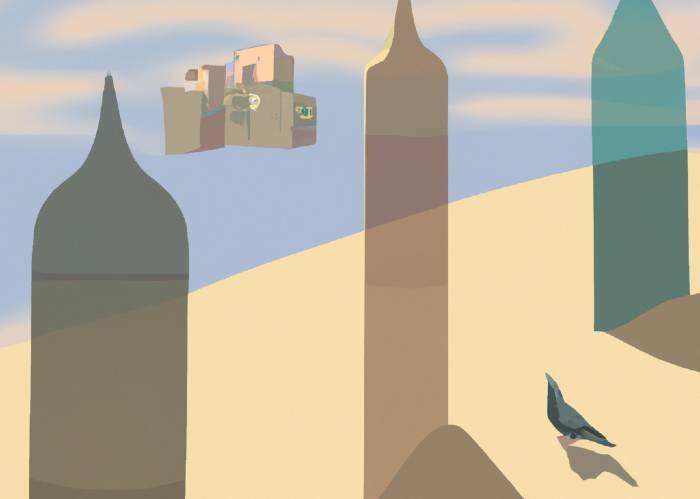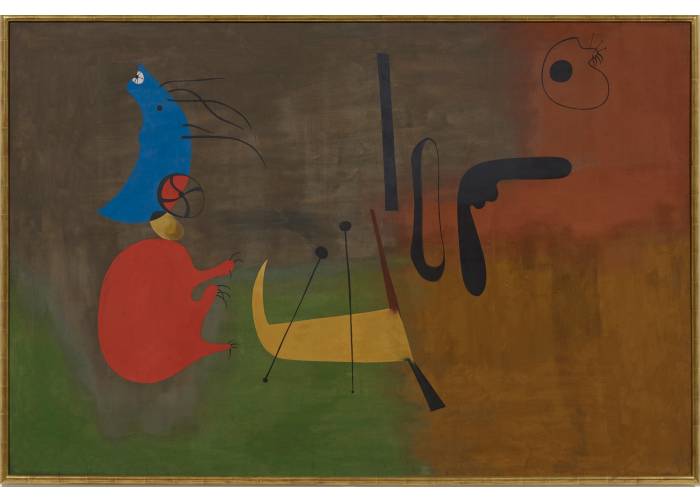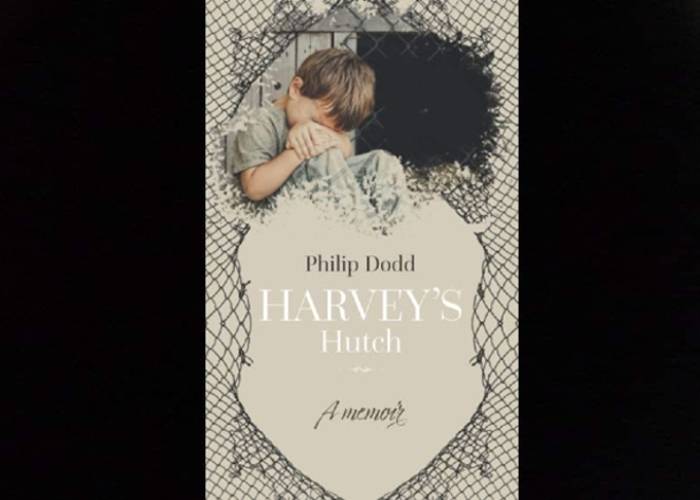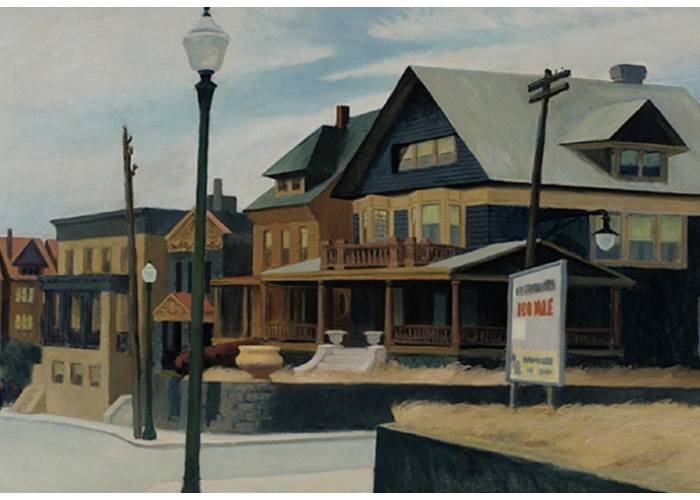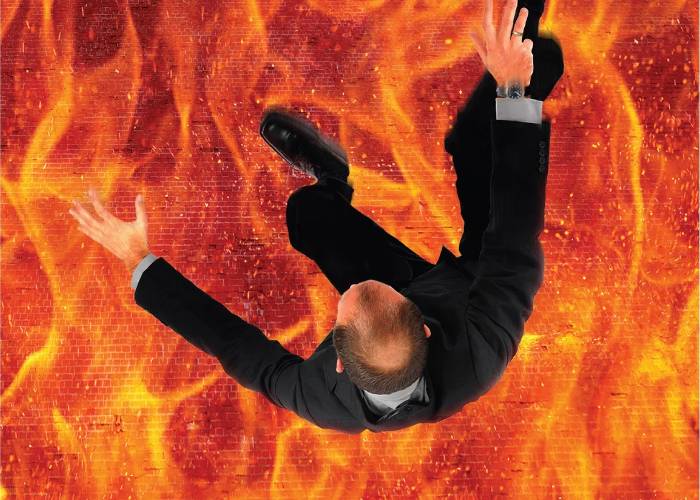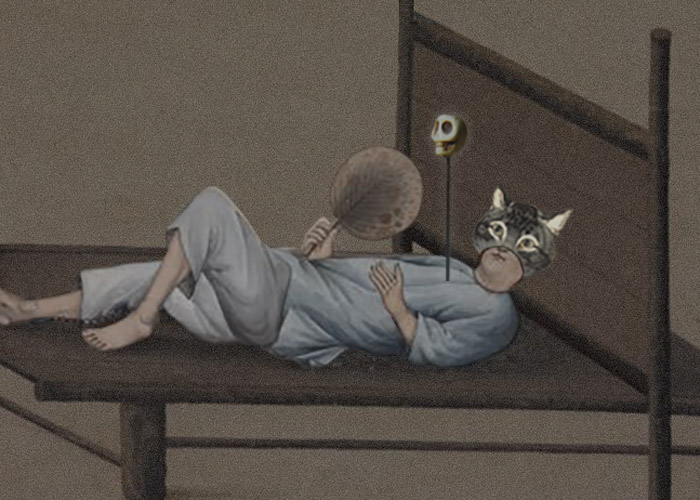Watcher started to read like an actor recording a radio play:
One day, Noone-Noone lost his favorite, wonderful pin and was overcome by grief. This pin was for him irreplaceable, necessary, even – one might say – the only necessity in his noone-nothingness life. And not even mentioning the fact that it was made of gold. He used it all the time to verify whether he was asleep or not! If he was to hallucinate, for example, that an eagle was picking its own liver, Noone-Noone would take his favorite pin, prick himself in his hand and immediately understand that it was just a dream. Eagles cannot pick their own liver, someone else’s, that for sure they can! Or if he was to think that his own peasant father was born in a family of peasants from Sichuan province, and after some time his grandparents would come along attached to the hem of his wife’s skirt. Well, it cannot be that a series of births occur in the opposite direction of the natural order of all things. Thus, all of it was once again just a stupid dream. The pin had once again saved the day! Recently he had actually imagined that demons were frying him on a pan in hell! Poor Noone-Noone barely managed to hold his pin, that’s how much his hands were shaking from fear. Despite that, he managed to somehow get his pin and to prick himself, really hard in the butt this time, for good measure. And once again everything was back to normal. How could demons be frying him in hell? After all, who is he? – Noone-Noone! Now if he was someone, then it would be different. Otherwise, it’s of course complete nonsense. Isn’t it obvious? Anyway, as if it was exceptional to imagine different situations! No point even mentioning all of them! What was important is that in all these situations, no matter what they were, he had his wonderful golden pin – the most trustworthy way to differentiate dream from reality. Do you understand now why Noone-Noone was so devastated? Where could it be, my wonderful pin? – Noone-Noone was desperately asking himself day and night. He would think about it for many days and nights on end and life without his pin was impossible to imagine. He wandered on many roads and through many villages, asking whether someone had seen his wonderful pin. But nobody had even heard of such a thing. People just shrugged their shoulders. Until a peasant from Sichuan province (Perhaps the same one in whose family his own father was born followed by the grandparents?) did not take pity on Noone- Noone and didn’t give him his pin, that wonderful pin, but instead gave him a very ordinary one.
“But will it be able to distinguish dream from reality like my wonderful pin that I lost?” – asked Noone-Noone suspiciously, twirling the pin around in his hands.
“After all, there’s really nothing special about it.”
The peasant’s pin did indeed look quite simple and modest with first signs of rust that naturally didn’t make it any more impressive. Noone-Noone was seriously doubting the equal value of the replacement.
“You want it, take it. You don’t, then don’t take it. Up to you. Don’t eat, don’t drink, don’t sleep, keep wandering in search of your wonderful pin,” noted the peasant with indifference, turned around and went his way.
“Wait, Wait! What did you say?”Noone-noone sounded surprised. “Wander, don’t eat, don’t drink, don’t sleep?!”
But the peasant did not repeat himself.
Watcher laughed again, winked at Jolie, then carefully closed the book and moved away to put it back on the shelf. A small silent pause had formed, from the alternating sound of rain and Gerry Mulligan.
“I liked the parable; it reveals the futility of the world and its instruments,” announced Jolie, once Watcher had returned to his seat. “Are you an admirer of Mao?”
“Do you believe that Mao himself knows what he is doing?” – he replied ironically with a question.
“I doubt it. Just like Egyptian pharaohs didn’t know why they were erecting their pyramids, or Chinese emperors didn’t understand why they were making their subjects build a wall, thousands of miles long.
“Bravo, Mademoiselle Jolie, you have already started reading Kafka!” Watcher applauded symbolically.
“Is that so?” Jolie shrugged.
“I am most certain of it, so you can believe it. It’s not always necessary to open a book in order to read.”
“Well, if I see something that your friend Kafka had previously noticed, then it means that he didn’t write it either.” Jolie laughed it off.
“And once again, you are right,” affirmed Watcher, pulling up the sleeves on his loose satin shirt, “- but you have therefore replied to your own question about idolatry.”
“I understand,” she had never been a worshipper of idols.
While putting out her cigarette, Jolie thought about how much they had been smoking in the shop and that all the birds had probably died by now. Then she remembered that Watcher had switched them off with one snap of his finger.
“So, actually, there are no birds here either then?” he suggested.
“The birds are here, but they mean very little.” Having said that, with a snap of his fingers, Watcher turned on the voices of the birds again for a few seconds, to demonstrate they were real, and then, just like that, switched them off again.
“What do you think,” Jolie finally decided to ask after internal debate. “Will he return?”
“Do you want him to glue you back together? Yes, I guess no vase has ever been able to glue itself together.” Watcher said without any humor, as if thinking out loud. “Only what for?”
“I don’t really know why either,” sighed the vase, broken a long time ago.
“This is, unfortunately, only for you to decide, my dear Mademoiselle Jolie. The Kong will not help out the Hong,” Watcher attempted at a pun. Or perhaps it really had been some well-known ancient saying in its own time, one that she had simply never heard of before.
The rain continued to deliver notes that were inaudible to regular ears on Paris streets, when Jolie left the bird store. Gerry Mulligan, birds, Watcher – they all remained behind her forever, back in a time that was lonely and foreign even to itself.
He watched Jolie for a while through the blurry window as she carefully skipped between puddles, then, like an alpine tight-rope walker, balancing on an umbrella, she walked along a narrow curb between the mountain rivers determined to wash her away, flowing into the toothless mouths of the city sewage that absorbed them greedily. Watcher is by definition a watcher because he watches. So he watched, gently shaking his head, with the reflection of an unnatural hot flame flashing in his eyes and in his ears, he heard for the second time in his life – something quite impossible – the call of the Desert, making his lips move inaudibly, uttering some uncertain exhalations or perhaps prayers of gratitude or an incantation.
Kangaroo met her in the corridor, as usual, with its fatally unblinking eyes and unbearable fatigue. What is he so tired of? – Jolie wondered, trying to get out of her drenched clothes faster and to get rid of the wet umbrella damaged as an autumn flower. She wanted to take a hot bath – with some ancient Precambrian salt, not even touched by trilobites, and with abundant foam – the promise of a possibility to submerge at the bottom of the sea like a mysterious sea monster and at the same time escape into clouds like a beautiful wild bird. She threw off her shoes in a hurry, each one flying into a different corner of the corridor, and her wet footprints visible on the floor followed her into the room, although she had not invited them there. Stop! She turned around and followed those same wet footsteps in the opposite direction and turned on the light. Cat food in the aluminum bowl and water remained nearly untouched, but there were a few bits of gray fur with a hint of white in them lying around on the floor. Kangaroo, the creature had started to shed! Jolie, slumped against the door with her arms crossed on her chest, was looking at the fur in disbelief for several minutes. It was lying there completely motionless, even though her wet feet could clearly feel the weak laminar draft coming from the corridor.
She lowered herself to her knees in front of the creature and sat down pushing the bowls with food and water to the side. “What is going on with you?” She asked gently, trying to make the kangaroo focus its gaze on her. (The creature was not big and their eyes were on the same level). But the kangaroo, like before, did not want to pay attention to her, or thought that everything was pointless, including this. Now, in addition to the unbearable fatigue, she caught in the glassy eyes of the creature an obvious desperation – a torment – the source of which she was trying to understand with all her being. What is this? What is this? What’s happening to you? Just like only a minute ago she had wanted to relieve her body of the wet and overbearing items that were sticking to her body and to remain in her birthday suit, the creature wanted to relieve himself of something that was undoubtedly tormenting him – only in his current form of existence that was absolutely impossible. “A broken vase cannot glue itself back together, – Jolie repeated the words of Watcher, – right?”
Suddenly a strange thought developed in her mind, if thoughts even do develop in anyone’s mind. The creature had remained in an absolute permanent state for many years and now it was getting old, deteriorating, shedding, but all of it only because it was trying to make its cries heard, to tell her that they couldn’t continue like that any longer and that she needed to take action immediately. “Maybe it’s not time that ages a person, but a person is telling God through the aging of its unbearable torment caused by its current form of existence. That desperation accompanied by that same unbearable fatigue accumulates slowly – at first there’s hardly anything, you don’t even notice it, that’s how little of it there is. But then there is more and more, accumulating like tears in auricles and they have to be drained or else they will start to spill over.” Only now did she finally understand the idea behind the endless rain, the highest manifestation of the deliverance of this despair. The creature is unbearably tired because I don’t hear it, no one does. “Please, Please… forgive me, I am so insensitive, I… We all are…” Jolie grabbed the creature by its neck with her hand, pulled it towards herself, and together shaking and sobbing, slowly descended onto her side, to the cold floor, right in front of the entrance door.






























